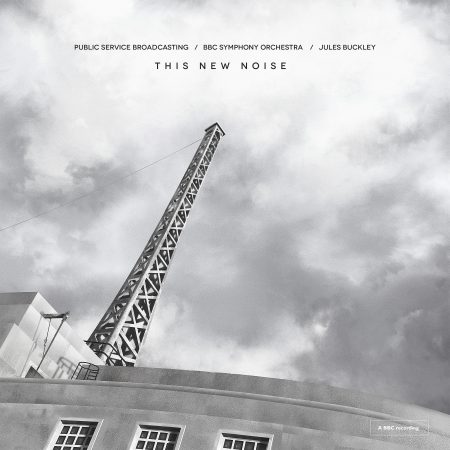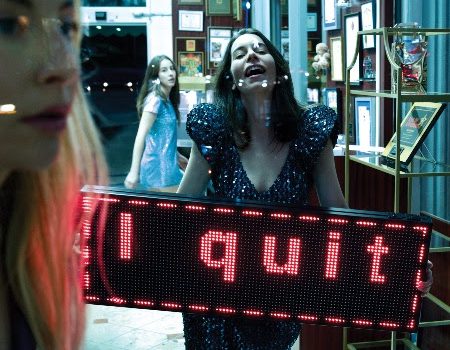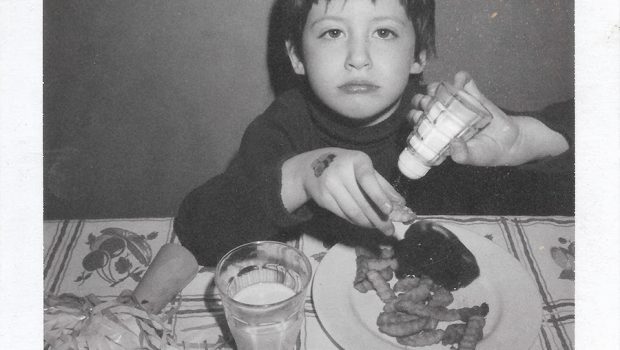 No band could have been more suited to performing at a Proms celebrating the centenary of the BBC than Public Service Broadcasting. Their name alone, let alone that their 2013 debut album was titled ‘Inform – Educate – Entertain’, the mantra of original BBC Director General, John Reith, as to the Corporation’s role, make them the perfect fit. J Wilgoose Esq and his accomplices set out to “teach the lessons of the past through the music of the future” and their sample heavy music makes for the grooviest set of Media Studies revision notes.
No band could have been more suited to performing at a Proms celebrating the centenary of the BBC than Public Service Broadcasting. Their name alone, let alone that their 2013 debut album was titled ‘Inform – Educate – Entertain’, the mantra of original BBC Director General, John Reith, as to the Corporation’s role, make them the perfect fit. J Wilgoose Esq and his accomplices set out to “teach the lessons of the past through the music of the future” and their sample heavy music makes for the grooviest set of Media Studies revision notes.
For their 2022 Proms appearance which has been subsequently remixed for this release, they were joined by Jules Buckley who has become the go-to candidate for pop music Proms in recent years having conducted both the Quincy Jones and Nina Simone tribute events together with Moses Sumney’s stellar performance.
In their song titles and choice of samples, PSB choose to celebrate and maybe idealise the virtues and founding principles of the BBC, however patrician they may have been. It is easy to become frustrated by the modern-day BBC, especially its news coverage which has become in thrall to pressure from its Conservative political masters and rivals in the print media. Under pressure from underfunding, some management decisions such as ending the new music programmes provided by Roger Hill and Steve Barker on BBC Radio Merseyside and Lancashire respectively have also alienated their erstwhile champions. However, its model is priceless and ensures that stations like 6 Music and Radio 3 continue, even though they would not be commercially viable.
The eight tracks that comprise ‘This New Noise’ commence with ‘Ripples in the Ether (Towards the Infinite)’which starts with white noise and test frequencies before recordings of plummy voices undertaking the tests emerge. The orchestration is serious and sombre which matches the intensity of the original work being undertaken. In contrast, the title track crashes in with startling burst of sound, making full use of the 88-piece BBC Symphony Orchestra. There are quotes from both Reith and former Chair of the Board of Governors, J.H. Whiteley on its purpose and ideology before ending with a stirring orchestral flourish. ‘An Unusual Man’ also celebrates Reith with found voices describing his character, a quasi-religious fervour and sense of seriousness, together with his desire for political independence and freedom from commercial pressures.
Seth Lakeman guests on the performance’s most distinctive piece, ‘A Cello Sings in Daventry’, the only track with singing. Daventry was home to the strongest transmitter which offered over 20m listeners access to what was considered the best in all fields. Dependent on atmospheric conditions it could be heard further afield and this piece features the translated words of German poet, Robert Seitz, who tuned in from Berlin and was moved by what he heard.
‘Broadcasting House’ takes voices from the Stuart Legg film, ‘BBC: The Voice of Britain’ and a radio documentary from the early 1930s. The orchestra gradually adds to the keyboard chug, providing kaleidoscopic colour to the sepia tinged quality of PSB’s palette.
One of the quirkiest reflections, ‘The Microphone (The Fleet is Lit Up)’ has George Bernard Shaw celebrating the microphone’s capacity to pick up the insincerity of politicians that would have been unchallenged at rallies and the dangers of having a drink prior to taking to the airwaves. Inspired by this, PSB revisited one of their earliest tracks, ‘Lit Up’, to capture the drunken commentary of Thomas Woodrooffe while increasingly frenzied orchestration hits a thrilling peak.
‘A Candle That Will Not Be Put Out’ revisits themes of a remit to provide the best possible standard and range of programme, not just entertainment alone, while the orchestra matches the grand nature of the BBC’s purpose. The final track, ‘What of the Future (In Touch with the Infinite)’ takes its titles respectively from Arthur Burrows’ book ‘The Story of Broadcasting’ and Reith’s ‘Broadcasting over Britain’ and has idealistic voices expounding on how the BBC will help build a better, more cultured and creative nation while the music strikes a reflective note.
‘This New Noise’ is a pointedly political undertaking, challenging the dominant strand of the past 40 years in which the market is portrayed as providing all the answers. For all its mistakes, a broadcasting environment without the BBC or with a weaker version of it, is a diminished place. The collaboration between PSB and the BBC Symphony Orchestration gives these pieces a heightened physical quality, a successful marriage of modern and traditional instruments and styles.
Public Service Broadcasting / BBC Symphony Orchestra / Jules Buckley: This New Noise – Out 8th September 2023 (Test Card Recordings)
New Noise – Public Service Broadcasting, BBC Symphony Orchestra, Jules Buckley (BBC Proms) – YouTube
















